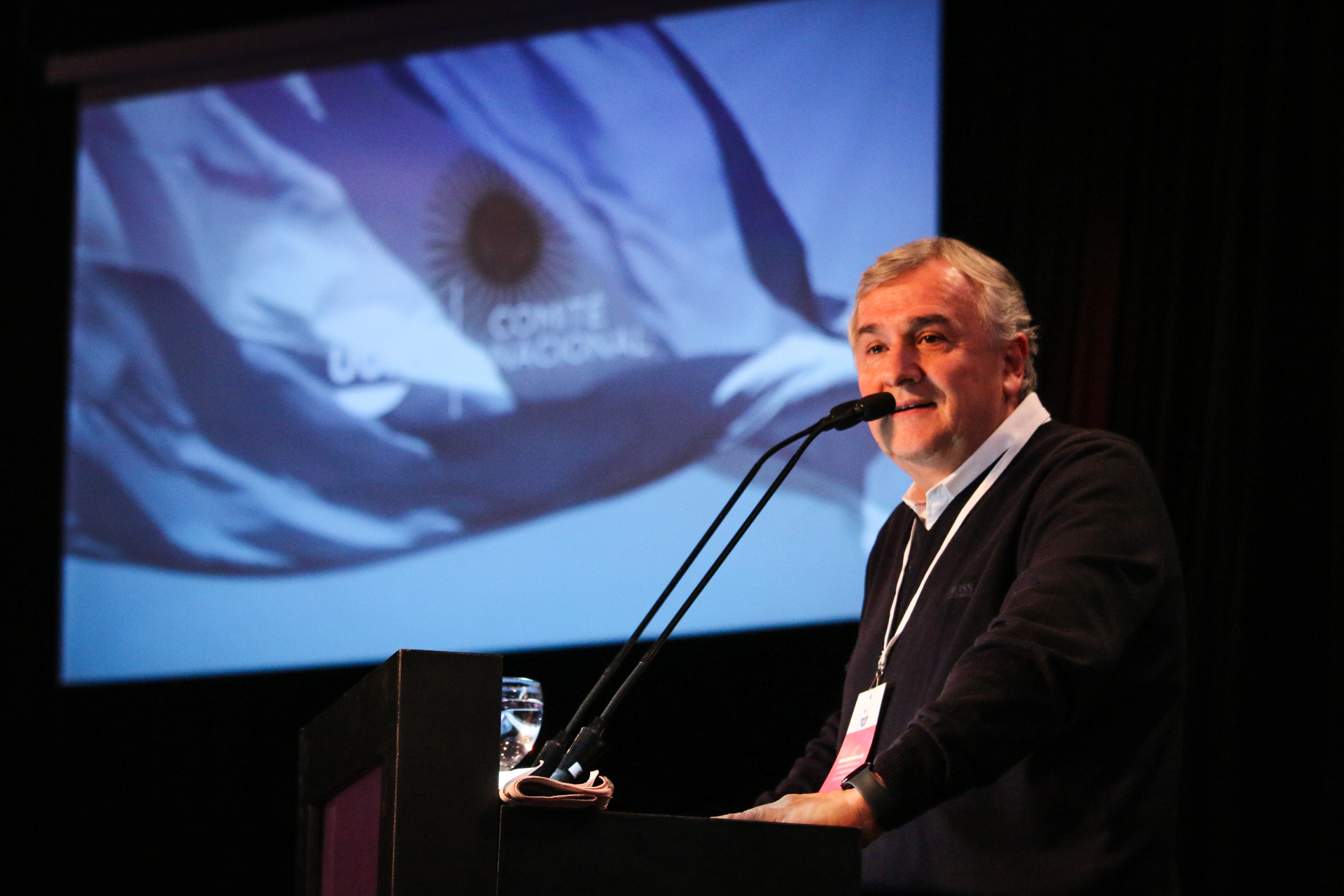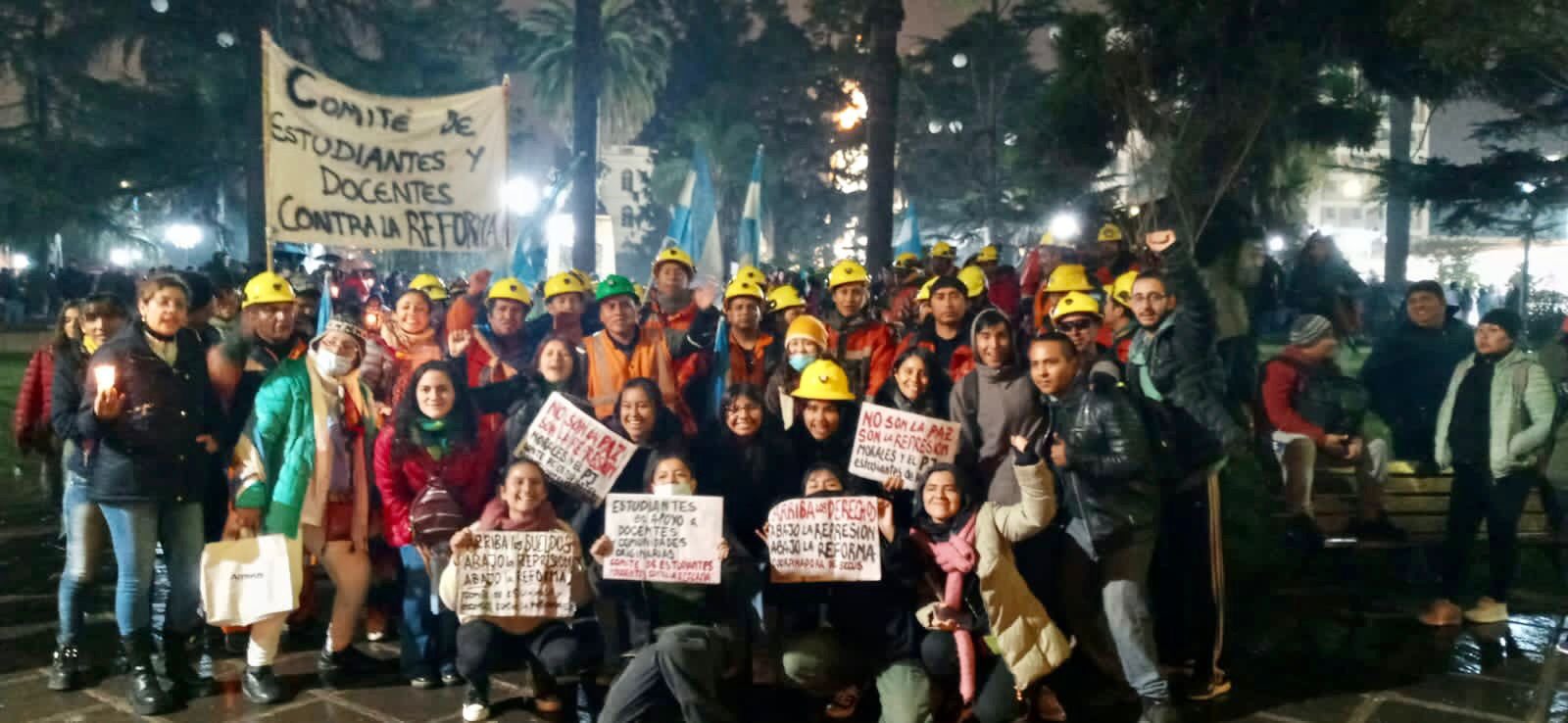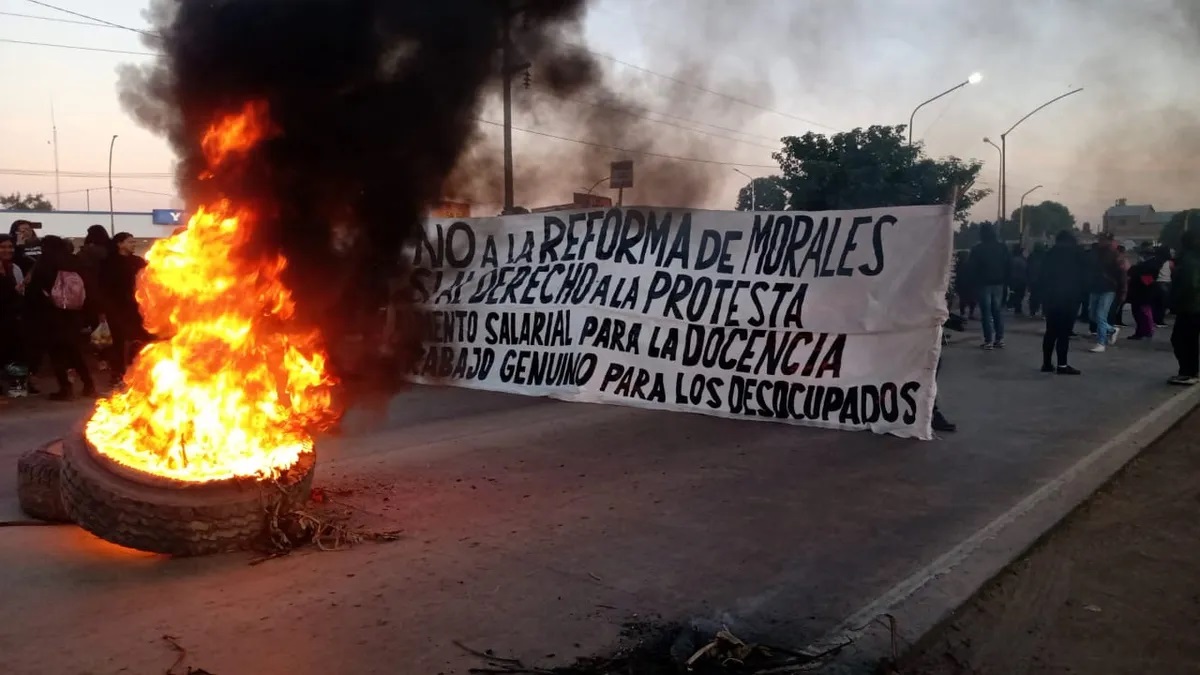The last few weeks in Argentina have seen an increase in the struggle of workers, particularly teachers and healthcare workers. This movement has reached the most acute proportions in the provinces of Salta and Jujuy, in the extreme northwest of the country. In both cases, the struggle for wages has been combined with the fight against anti-protest and anti-strike legislation that the regional governments want to impose.
In the case of Jujuy, the mechanism to introduce these undemocratic laws was a new constitution that also violated the rights of indigenous peoples in favour of lithium mining interests. In Jujuy, the struggle reached insurrectionary proportions, a pueblada, due to worker and popular resistance to the brutal state repression. In this article, comrades of the Corriente Socialista Militante (IMT) explain these events and discuss the strategy needed to win.
The capitalist crisis as a sign of the current period
Rising class struggle is on the order of the day in Argentina, as evidenced by recent events. The Argentine crisis is only a local expression of an organic crisis of capital, which is expressed in the world market as a whole.
There is a persistent fall of capitalist investment in production, which in turn generates an increase in unemployment and thus in poverty. We have seen galloping inflation that relentlessly crushes spending power, compounded by cuts and austerity applied by the Frente de Todos government, spearheaded by the Minister of Economy Sergio Massa, and with the approval of the opposition Juntos por el Cambio (Together for Change). All these factors are slowly preparing a powerful upsurge of the workers, poor and the youth. When and how will this mobilisation take place, and of what magnitude will it be? It is not possible to predict it in advance.
However, the analysis of the concrete situation in the country, and the economic perspectives, shows us that the conditions exist for this to happen. As we pointed out in our perspectives document, recently approved in our congress, on the possibility of a new Argentinazo, nationwide uprising:
“We understand that a revolutionary process can be opened again, because the international conditions of economic, political and social crisis are exceptionally critical, and determine the Argentine economy in many aspects.”
Salta
No sooner had our 2023 national congress concluded than we saw the first glimpses of such mobilisations, with the peak of the struggle of teachers and health workers in the Salta province.
Towards the end of May, teachers and health workers, self-organised and bypassing their union leaderships, organised roadblocks on the north highway, to demand wage increases and against pay being docked for strike days.
El Jujeñazo https://t.co/F35q3IFXhg #JujuyResiste #JujuyDePie #JujuyEnLucha #AbajolaReformadeMorales #AbajoLaReforma #FueraMorales #Jujuy pic.twitter.com/pQknZPpsAD
— Militante Argentina (@Militante_Arg) June 22, 2023
This struggle was a direct response to the austerity and attacks of the national and provincial governments, which had agreed to below-inflation wage increases in order to guarantee the commitments of cuts made to the IMF.
After four weeks of an all-out strike, the struggle of the teachers and health workers forced a meeting of their bureaucratic leaderships with the regional government at the end of May, which achieved a 69 percent wage raise, still below the demand of the strikers.
In the same way, the Massista government of Salta, headed by Gustavo Saenz, tried to defeat the struggle by means of police repression, even arresting 19 strikers. The persistent struggle of teachers and state employees succeeded in defeating the measures of the anti-picket laws.
This struggle, which evidenced the fighting potential of the Argentine working class, which in the last period has not yet been put to the test in the streets, infected the teachers and public workers of Jujuy.
Jujuy
After a month of roadblocks, self-organised strikes and mobilisations in Salta, in Jujuy the masses did the same, and took a step forward. Although the struggle of the people of Jujuy was largely inspired by the mobilisations in Salta, there the issue of the provincial constitutional reform proposal of Governor Gerardo Morales also played a fundamental role.
Morales, loved equally by Massa and the right wing of the Frente de Todos, as well as the opposition Cambiemos combo, has been in recent years an ideal bourgeois political leader, faithfully implementing a pro-business policy.
As we have explained for years in numerous publications, when the capitalist crisis reaches its point of greatest aggravation, there are only two possible exits. Either the working class takes power to resolve the crisis in favour of the oppressed majority - or at least, initiates a process of mobilisations, organisation and struggle in order to achieve that end - or the bourgeoisie uses state power to defeat the working class and impose its preferred policy.
 Morales already has a very notorious record of repression / Image: Gerardo Morales, Twitter
Morales already has a very notorious record of repression / Image: Gerardo Morales, Twitter
The struggle of the teachers and workers in Salta, as well as that of the teachers in Jujuy and the native peoples of Jujuy, have been in the political spotlight in the country in the last few weeks.
To a large extent, and taking into account other mobilisations that have developed in the last year, such as those by the tyre workers and in the health sector, these are a prelude to an upsurge in the class struggle, for which all the necessary material conditions are in place.
Morales already has a very notorious record of repression, showing how the capitalist state apparatus must be used to prosecute and atack workers' organisations in order to unload the weight of the crisis on the shoulders of the working class.
We have seen this, for example, with the sham trial and the persecution against the Tupac Amaru organisation and its leader Milagro Sala, in recent years. The constitutional reform is a further advancement in the direction of naked repression.
Morales’ reform is being applied in blood and fire
The constitutional reform proposal is clearly a tool of the provincial bourgeoisie and its parties to seek a way out of the crisis, at the cost of more suffering and misery for the working class.
Its central elements are a deepening of the plundering of lithium in indigenous territories and defending the interests of the real estate business on the basis; concentrating powers in the provincial executive to bypass the usual controls in the legislature; and the destruction of the democratic rights of protest and mobilisation of the working class.
This has generated enormous anger throughout the province, which has translated into a massive working-class and popular response.
Particularly noteworthy are the protests in Purmamarca, where indigenous communities and workers came out to block roads in response to this terrible reform, which in the end was approved, under the cover of darkness, on 16 June, with the support of the main bourgeois parties of the country, both ruling and opposition.
Police repression was used to disperse the people, resulting in 69 arrests, including PTS-FITU provincial deputy Natalia Morales and La Izquierda Diario journalist Luciano Godoy, who was covering the events first hand.
All this was taking place in a political context in which the mainstream media maintained a deafening silence, for fear that the example of Jujuy would spread to the rest of the country. From the Corriente Socialista Militante, we join the demand for the immediate release of all detainees. So far, Natalia Morales has been the only detainee released. The whereabouts of the detainees were only made known on the night of 20 June, leaving some detainees unaccounted for. The police have also left dozens of people wounded, some even hit in the face with rubber bullets, blinding them.
However, despite the repression, the working people of Jujuy have not allowed themselves to be intimidated. We have seen this in Purmamarca itself, where the inhabitants have tenaciously maintained their struggle, and, regardless of the bullets and arrests, they reoccupied the road in the late hours of the night, pushing the police back.
In the same way, the repression has had an immediate effect on the class solidarity of the people throughout the province.
Roadblocks and protests continue in several towns, including in the capital San Salvador de Jujuy. More than a thousand people remained blocking the entrance to the capital of the province. In Palpalá, the police backed down in the face of the militancy and fury of the people; and in San Pedro the police tried to arrest the teachers who were carrying out the protest. There have also been protests and/or roadblocks in Ledesma, Humahuaca and Tilcara.
 The solidarity of the working class throughout Argentina against the repression and the dictatorial reform of Morales is urgent / Image: Alejandro Vilca, Twitter
The solidarity of the working class throughout Argentina against the repression and the dictatorial reform of Morales is urgent / Image: Alejandro Vilca, Twitter
What we are seeing today in Jujuy is a glimpse of how an important sector of the national bourgeoisie would like to increase profits at the cost of the blood and misery of the people. Current events in Jujuy are a perspective of the forms and methods that a sector of the bourgeoisie and its parties could use to get out of the crisis, brutally unloading all its consequences on the working class.
Therefore, from the left and the workers' movement, we must give a forceful response to this declaration of war by the capitalists against the workers in Jujuy. In addition to joining his battle, the left must organise a general plan of struggle to stop the repression, to achieve the release of the detainees and to defeat the Morales reform, but also against the general adjustment and for the recovery of wages.
This plan should be developed democratically in workers' assemblies, and ultimately, through a workers' congress, lead to the preparation and call for a general strike.
The solidarity of the working class throughout Argentina against the repression and the dictatorial reform of Morales is urgent. This struggle belongs to all of us. If we win in Jujuy, this will be a victory for the whole Argentine working class. If we lose, this will also be a defeat that all of us will carry on our shoulders. This is the first important salvo of many key battles to come in the ascendent class struggle.
It is very important for left, worker and popular organisations to break the media siege around Jujuy by the bourgeois press. Our forces must give detailed accounts of the real situation on the ground. But it is not enough to limit ourselves to this, nor simply denouncing the infamous reform and the repression. Without organising the struggle and carrying it forward to its ultimate conclusions, victory will not be achieved.
- Down with repression!
- Freedom for all detainees!
- Down with the reform!
- Down with the Morales government!
- Fight until victory!
‘Pueblada’ in Jujuy: the working class and indigenous peoples are fighting in the streets for the general strike!
At the time of writing these brief lines, on 20 June, the working class and the indigenous peoples are fighting in the streets, metre by metre, in front of the Jujuy Legislature.
The police are using rubber bullets and gas, and the workers with stones and metal sheets to protect themselves.
There are reports to the effect that the reactionary police are changing rubber bullets for lead and there is a worker wounded, in critical condition. Workers' blood is flowing in the streets. 22 roadblocks are maintained.
On their side, the Confederation of Education Workers of the Argentine Republic (Ctera) and the Trade Association of Teachers and Researchers of the UNR (Coad) are calling for a national teachers' strike. But on the other hand, the leadership of the CGT continues with the policy of surrender and submission to the capitalists and the parties of the regime, without calling for a national strike, trying to isolate the struggles. In the bureaucratised unions, the interests and privileges of the leaders prevail over the real needs of the working class.
Politicians, on both sides, blame each other. Juntos por el Cambio points out that Kirchnerism resists the reform, according to Horacio Larreta's words, supporting the Government of Morales. While Kirchnerism only denounces the right wing, including the internal sectors of the Frente de Todos.
The struggle of the workers of Jujuy is our struggle. If these reactionary reforms pass, it is a precedent for the struggles to come.
It is necessary to defeat the government of Morales and the PJ-FdT and PRO-Juntos por el Cambio convention members, who only prioritise the profits of imperialism and the parasitic local capitalists. Their interests are those of the bourgeoisie that is trying to deepen austerity measures.
The left must definitively break with this parliamentary impasse and put the interests of those at the bottom as an immediate priority.
The main task is developing the organisations that already exist in the streets, roads and schools, debating the organisation and calling for a general strike. This would put on the table the question of power, and the need for a workers’ government, in the face of collapsing wages and living conditions.
- Down with repression!
- Down with the infamous reform!
- Down with the Morales government!
- For a meeting of delegates from across the North West to prepare the general strike!
- For a workers' government!
- Struggle until victory!

